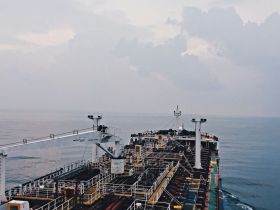Nigerian parliament paves way for oil and gas investment
Quantum Commodity Intelligence - Nigeria has moved a step closer to unlocking the investment drought in the country's oil and gas sector after legislators finally passed the Petroleum Industry Bill on Thursday that has been in the works for two decades.
Both chambers, the House of Representatives and the Senate, of Nigeria's parliament have passed their own versions of the bill that overhauls nearly every aspect of the country's oil and gas production.
The chambers will need to meet again to work out the details and iron out differences, and the bill will still need Presidential approval to go through and should be enacted this year.
Just 4% of the $70 billion investment made in Africa's oil and gas industry between 2015 and 2019 was in Nigeria even though it is the biggest producer and has the largest reserves on the continent, noted accountants KPMG Nigeria, a division of KPMG.
In 2020, $53.5m, or 0.55%, of total investment of $9.680 billion in Nigeria in 2020 was made in Nigeria's oil and gas sector, KPMG added.
The bill includes a string of changes sought by oil majors, including amended royalties and fiscal terms for oil and gas production.
There will be an Upstream Regulatory Commission for upstream operations, including the granting of petroleum exploration licences for three years, which can be renewed for another three years.
There will also be a Midstream and Downstream Regulatory Authority for midstream and downstream operations.
Both authorities could be rolled under the jurisdiction of one Commission.
The bill will also transfer assets and liabilities of state oil company Nigeria National Petroleum Company's into a limited liability corporation.
Stakes in the new NNPC Limited will be evenly distributed between the finance and petroleum ministries, but would not allow for public share sales without further government approval.
Legislators have been hashing out details of the bill since President Muhammadu Buhari presented an initial version in September last year, but an overhaul has been in the works for some 20 years.
One of the main problems was how to share oil money between areas where petroleum is produced, and those in the northern and central parts of Nigeria where there is exploration but no production yet.
The house bill signed off on an increase in the share of regional oil wealth generated from production that host communities can claim from 2.5% to 5%, but the senate only approved 3%.
Communities had pushed for a 10% share.
"The Senate and House each passed different versions of the bill, which will now require reconciliation before it is sent to the president for assent into law," said Mansur Mohammed, from Wood Mackenzie's sub-Saharan Africa upstream research team.
"So there is still outstanding work to do before the PIB becomes law, but we see momentum behind the bill."
"If passed, the fiscal uncertainty deterring investment across upstream, gas, midstream and downstream will be alleviated. "
Nigeria's National Assembly breaks for summer vacation in mid-July to resume session in early September.
